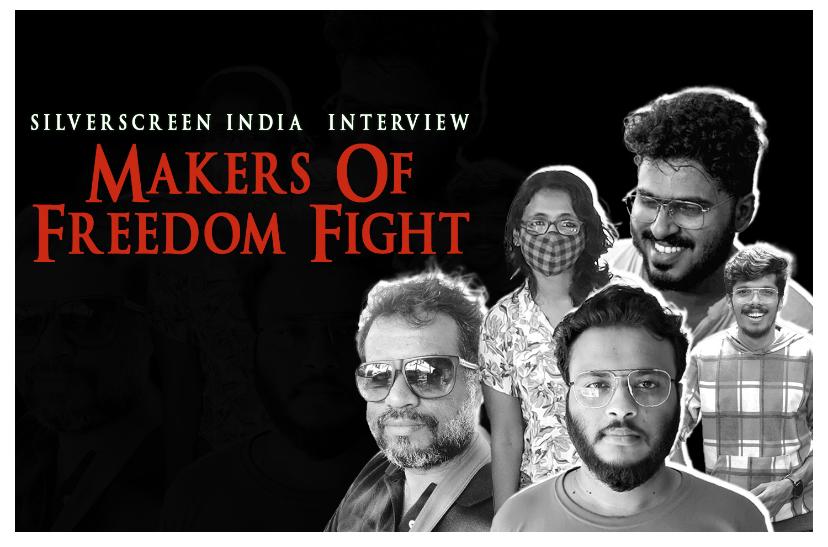Freedom Fight, the Malayalam anthology that highlights the significance of personal freedom, has garnered positive responses from both audiences and critics, following its release on SonyLIV on February 11.
Produced by the makers of The Great Indian Kitchen, the anthology consists of five short films by directors Jeo Baby, Kunjila Mascillamani, Akhil Anilkumar, Jithin Issac Thomas, and Francies Louis.
The five filmmakers talk to Silverscreen India about making their segments and how the project came together.
It was Baby who took the initiative to present this project in 2021. In a previous conversation with us, the filmmaker explained that after finalising his story, he had reached out to the four others and asked them to come up with their best stories in whichever genre or theme they wanted. The stories coincidentally all ended up having a common theme.
Now, all four budding directors unanimously say that they were able to give their best because they had “complete freedom” in the creative process to explore their desired areas of interest.
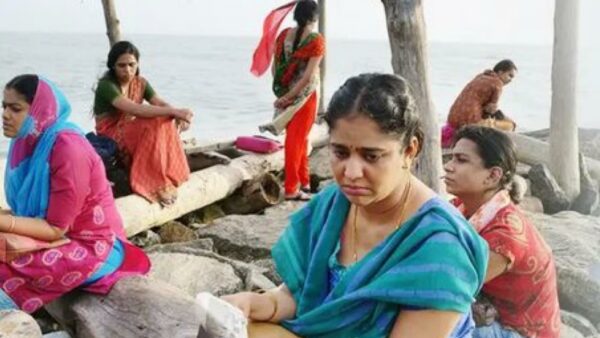
Kunjila’s Asangadithar (The Unorganised Sector), starring actor Srindaa, is a docu-fiction that revolves around the working women of Kozhikode’s SM street, who fought for access to toilets.
The story is based on real-life events. A human rights activist named Viji formed an association named ‘Penkoottu‘ for women to fight against the exploitation of their labour, including the imposition of long working hours. Further, the shopping complexes in the area had no toilets, despite a government mandate directing all commercial buildings to provide such facilities. In 2014, Viji formed the Asanghaditha Mekhala Thozhilali Union (AMTU), or the Union of Workers in the Unorganised Sector, to fight for such rights and amenities.
In conversation with us, Kunjila says, “In 2019, I came down to Kozhikode from Mumbai to make a documentary on Viji’s AMTU initiative. It was a crowdfunded project. While editing the documentary, I realised that I needed to shoot more. But, I couldn’t complete it. Later, after the release of The Great Indian Kitchen, I reached out to Baby and asked him for an opportunity to assist him in the future. One day, I received a call from him and he asked if I was interested in working on this anthology. That’s how I got on board.”
Kunjila has an inclination towards docu-fiction as she feels that the genre adds more depth to the content. And when she got the opportunity to be part of Freedom Fight, she felt that her documentary’s subject had the potential to be fictionalised.
“Although I had previously done some groundwork, the research material in my possession was purely fact-based. So, I wrote a script for this docu-fiction short after a bit more research. We did not use any footage from my documentary and simply recreated some of the scenes from it. We also added some fictional elements to the story. For example, there is a scene where the women break the lock of a shop. It was added to make the story more cinematic.”
The filmmaker notes that her short features a mix of actors and non-actors. The latter included activist Viji herself and members of Penkoottu. They had to attend a set of workshops and rehearse before the commencement of the shoot.
With respect to the current working condition of women in SM Street, Kunjila says that after many protests, now, there are common toilets in the vicinity and a few complexes also have toilets. However, many other issues continue to persist.
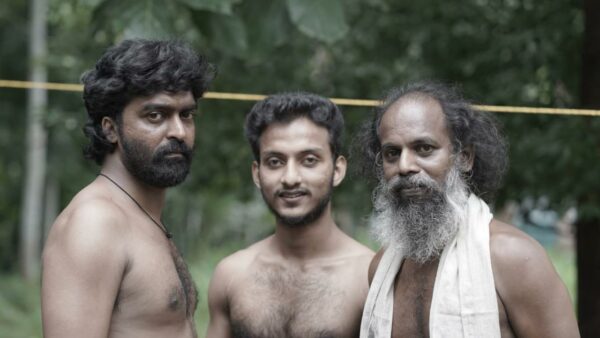
Jithin Issac Thomas’s Pra. Thoo. Mu. is a story about an atrocity against a sewage worker by a politician. It stars actors Unni Lalu and Sidhartha Siva. The hard-hitting film takes a staunch political stand, voicing out against inhumane acts.
The filmmaker says his interest lies in raw and realistic filmmaking, which he has employed in Pra. Thoo. Mu. He adds that he met Baby at The Great Indian Kitchen’s celebratory function, and that is how he landed the opportunity to work on this anthology.
“Earlier, I was living with friends in a flat in Ernakulam. One day, the septic tank overflowed and when we called the workers to fix it, they were unable to come immediately. We were asked not to use the toilet for six days, until it was repaired. We instantly planned to move out of the place. Whereas, had it been an issue with television or a pipe, we would have at least attempted to fix it by ourselves. That’s when I realised the importance of these workers and thought it would make a good subject for a film.”
While developing the story, Jithin and his team spoke to sanitation workers for inputs. The art direction team, headed by Manav Suresh, set up a septic tank and an original sewage tanker was brought in for filming. Jithin says that he opted to make a black and white film as he felt that the monochrome imagery would strongly convey the politics discussed in it.
“I did not intend to make a political short. But, the story I wrote demanded touching upon topics like power dynamics in society. However, I did not know the final output would create such a huge impact. I am glad about the responses,” he adds.
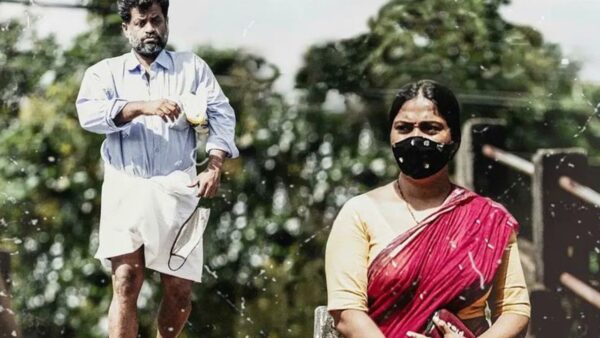
Francis Louis, who previously edited The Great Indian Kitchen, has directed the segment Ration, starring Kabani and Jeo Baby.
The story is about a middle-class homemaker (Kabani) who mistakenly cooks an expensive fish that was given to her by an upper-class neighbour to store. The story goes on to show her efforts to keep up her prestige and amicability with her neighbour. The film subtly discusses the intersection of gender and class differences.
“I got this idea from an incident that happened at home, many years ago. When I shared it with Baby, he encouraged me to work on it. At the time, I did not have an ending for the film and Baby gave me suggestions. The story was finalised after incorporating some fictional elements in it,” says Francis.
He mentions that he set the film in Kuttanad as fishing forms the people’s primary livelihood there. About the title, he explains that ‘Ration’ here means sharing and one of the film’s main ideas is about sharing food.
“Beyond class differences, I wanted to show what a dependent woman goes through with regard to ideas of wealth, prestige and the fear of being seen as underprivileged. At the same time, I did not want it to seem preachy or exaggerate it. So I tried to keep it subtle,” says Francis, adding that his experience with editing made it easy for him to make his film.
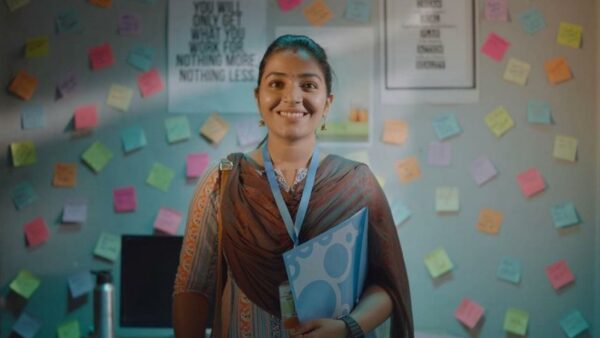
Geethu Unchained, which features Rajisha Vijayan, is directed by Akhil Anilkumar. The story revolves around a young woman who struggles to juggle her dreams and social expectations.
Akhil says, “I actually reached out to Baby to get someone else’s contact for producing my short film. That’s when he told me that he was planning to do an anthology and asked if I was interested. When I narrated the story, he instantly liked it, and we pitched it to Rajisha soon after. She was the first person I had in mind during the scripting process.”
The filmmaker says it took him two days to write the short, which was filmed over nine days in and around Kochi.
The short takes a light-hearted approach and Akhil says, “We as individuals are bound by this notion of what others will think. That was my idea for Geethu Unchained. This aspect is shown from a woman’s point of view. I wanted to try something out-of-box with respect to its treatment. So, I decided to break the fourth wall and have Geethu be the narrator who tells her stories directly to the audience.”
Interestingly, Akhil’s other film Archana 31 Not, starring Aishwarya Lekshmi, was also released on the same day, in theatres. On writing films centred around women, he says that he usually discusses the story with many women in his family and friends circle. “Their inputs and suggestions help me gain a better understanding of women and ensure that the right message gets conveyed,” he adds.
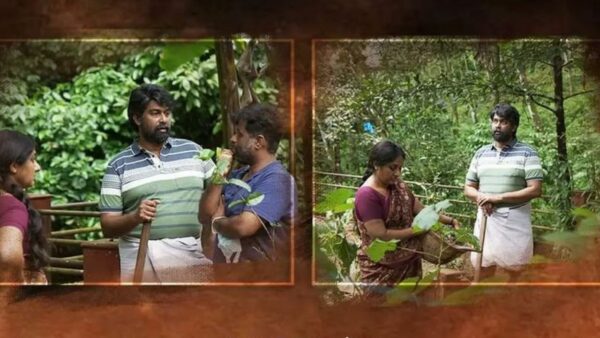
Baby’s segment, starring Joju George, Rohini and Lali, is titled Old Age Home. It revolves around an elderly man with memory loss and his urge to have the freedom to eat as per his desire. The film also shows the perspectives of his wife and house help.
“My dad had an issue with memory loss and that inspired me to make this film,” says Baby.
About the film’s treatment, he says that since it deals with old age, they decided to employ a slow pace. “We also used a lot of wide shots. Both were done with a view to convey the notions of loneliness and ageing,” he adds.
After the success of The Great Indian Kitchen, Freedom Fight is Baby’s second consecutive successful project to premiere on an OTT platform and he terms the medium a ‘boon’ for filmmakers.
Kunjila agrees. “Due to the current OTT boom, I feel that the scope has widened for indie films, beyond just film festivals and YouTube. And I definitely believe that our content reached a larger audience only because of this production banner,” she says.
